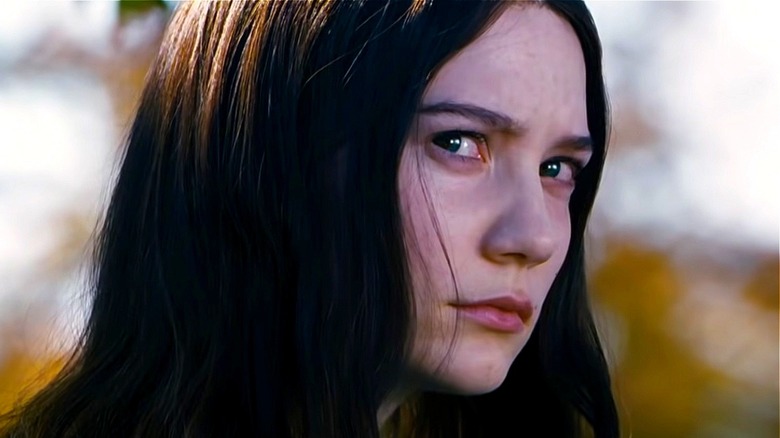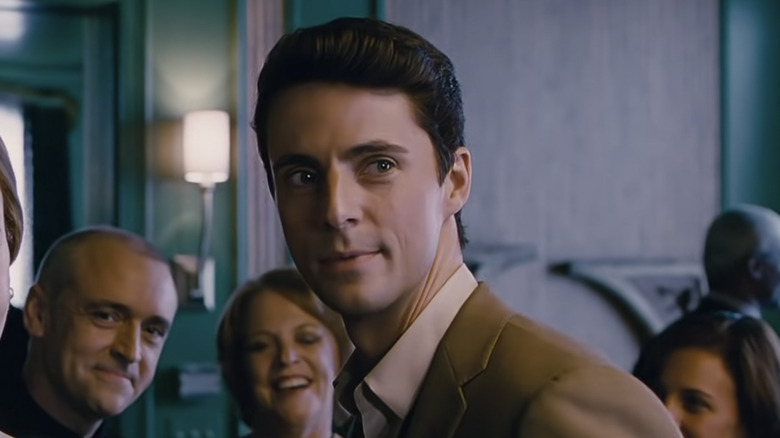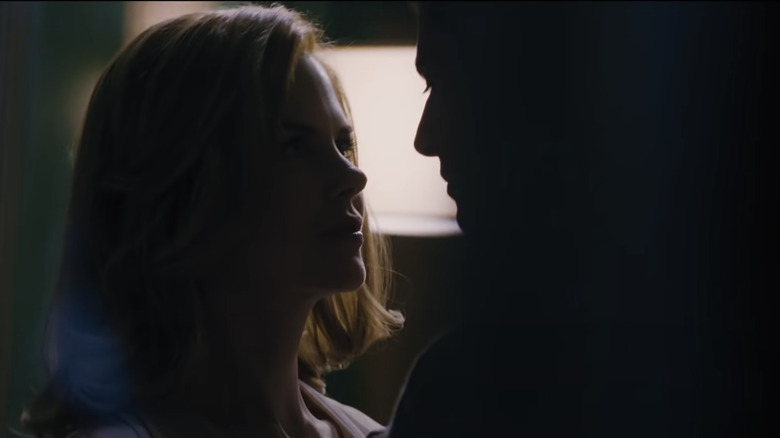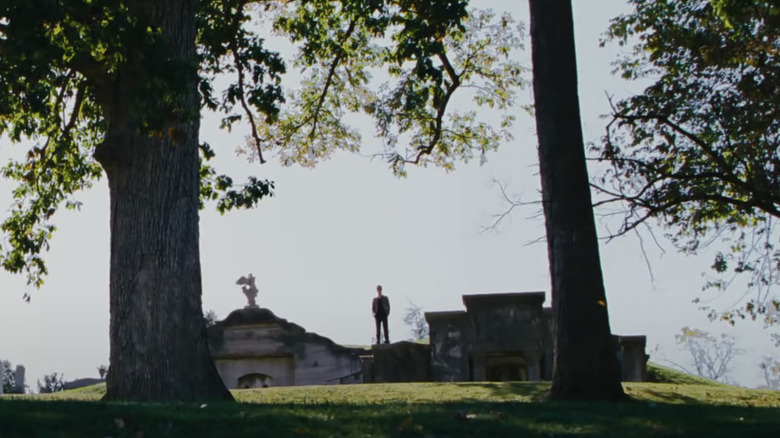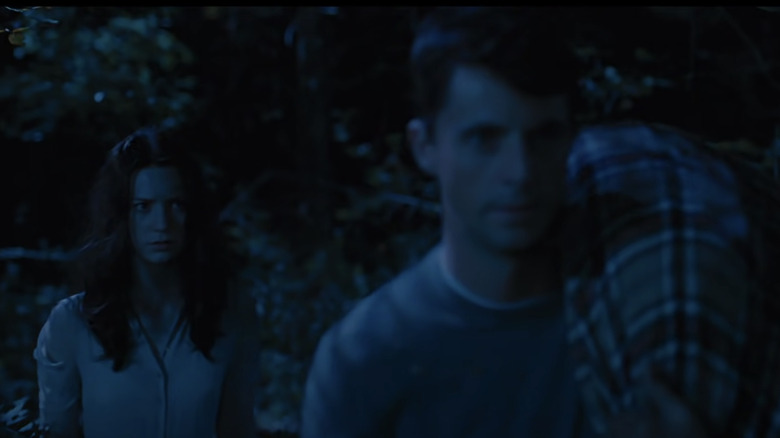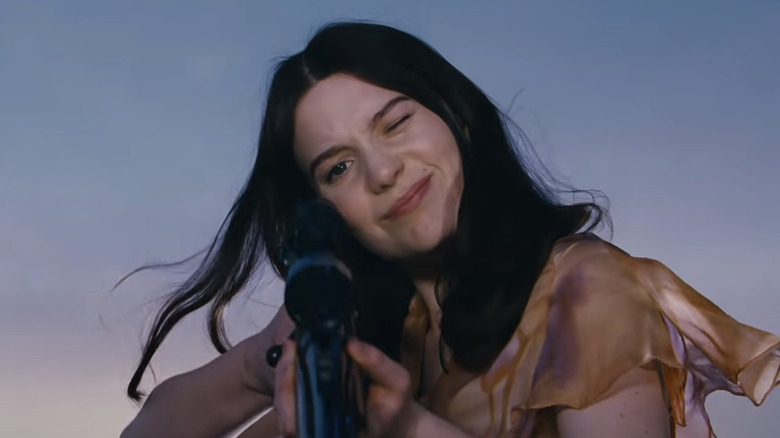The Ending Of Stoker Explained
The underrated 2013 psychological thriller "Stoker" is not for the faint of heart, but, if you love dysfunctional family movies, then this one's for you. Directed by Park Chan-wook (famously known for directing the 2003 cult hit "Oldboy"), the film centers on a teenager named India Stoker (Mia Wasikowska) whose mysterious Uncle Charlie (Matthew Goode) arrives to stay with her and her unhinged widowed mother, Evelyn (Nicole Kidman) after India's father, Richard (Dermot Mulroney) dies. Charlie may seem charming on the outside, yet there is something more sinister lurking beneath the manufactured facade of his boyish good looks. Much to their detriment (and horror), both India and Evelyn become infatuated and captivated by him.
Chan-wook creates an unsettling atmosphere ridden with psychosexual tension. As disturbing Stoker family dynamics unravel throughout the story's progression, we discover that Charlie's story is more complicated than he lets on and there's more to the Stokers than meets the eye. Put your Freudian spectacles on — here's the ending of "Stoker" explained.
Uncle Charlie's unexpected arrival
Referenced as a "cruel twist of fate," the shocking and seemingly accidental death of India's beloved architect father who was an important pillar of the community, starts off this dark tale. At the funeral, India notices an unrecognizable sinewy figure standing in the distance watching the service take place. Later on, while the family is preparing for the reception, India overhears the maids gossiping in the kitchen about the way that Richard died in the car accident as "strange," and how it will be difficult for her to live without her father since they had such a close bond. It's evident, not only to India but to others in the Stoker household, that India and her mother have been rather estranged since India was a young girl.
During the reception, Evelyn introduces Uncle Charlie to India, the brother of Richard nobody knows much about, and whom India never knew existed before. Lo and behold, it's the same figure she noticed earlier watching from afar in the graveyard. Charlie comes off as a suave, refined, and cultured gentleman since he has supposedly been traveling the world for years (or so he says). India notices early on that there is something off-kilter about him, which draws her further into his tangled, deadly web.
India and the Electra complex
India's disdain for her mother and the competition that ensues between them for the affection of Charlie can be chalked down to what Carl Jung termed the "Electra complex." This term is similar to the ideology of Sigmund Freud's Oedipus complex in young boys and their psychosexual attraction to their mothers. At an early age, the girl vies for the attention of her father leading to a desirable fixation on the male figure, favoring the father more than the mother (via Verywell Mind). The evident rivalry (and the resentment between mother and daughter that forms over time) for the love of the father is an essential signifier of what happened between India and her mother with Richard. Now, the vicious cycle is repeating with Charlie and his flirtatious behavior that he instigates to pin them under his alluring spell.
Playing on the complicated dynamic of mother and daughter, a scene where India is brushing Evelyn's hair conveys everything about their nonexistent relationship. Evelyn acknowledges that she never brushed India's hair when she was younger, and India responds by saying, "You were busy." Evelyn looks surprised, asking, "With what? You and your father were always on your hunting trips. How could I compete with all of those dead birds you constantly brought home?" The powerful emotional connotation here at this moment is that Evelyn felt left out of the time India spent with her dad, perhaps even feeling she had to contend for Richard's affections even more.
The brother who never was
While India is rummaging through her father's desk in his office, she discovers an alarming secret. She finds hidden family photos of Richard, Charlie, and their younger brother, Jonathan, when they were children – Charlie's face is cut out in a few of them. Other photos from when Richard and Charlie were teenagers only show the two of them, Jonathan missing. Perplexed, India keeps digging and notices a large stack of letters addressed to her from Charlie that he has been sending to her throughout the years of his apparent travels abroad — her father kept them instead. Overjoyed and on the verge of tears upon learning of an uncle who understood her and wanted to be a part of her life, India sees "Crawford Institute" stamped on the back of every letter.
Putting the pieces together, a panicked India reaches for her phone to call the sheriff's department. Charlie catches and corners her, asking if she wants to know what happened to Richard, to which she replies, "I'm curious about what happened to Jonathan." Recounting the details, Charlie shares that Jonathan was Richard's favorite, and one day when Richard had left the two alone together, an overly jealous and sociopathic Charlie buried young Jonathan alive. Thus, Charlie was taken to the Crawford Institute where he read every book and learned multiple languages while he was locked away, soaking up all the knowledge that he could.
He remained at the institute until the day he had chosen to be discharged, which happened to be India's 18th birthday. Richard picked him up, and gave him money and a car to go to New York where he would be set up forever, never allowed to come back. After Charlie pleads to be taken home, in a fit of rage, he hits Richard over the head with a rock until he is no more.
Blood really is thicker than water
"Everything I've ever done...for you, India" is Charlie's main reason for coming home. His sole intention was to reunite with India and embark on a journey of madness and mental insanity with her by his side. Essentially, his horrific craving is to be partners in crime (and lust). India covers for Charlie when a cop comes to their home asking questions about a missing boy who assaulted India (whom Charlie brutally killed in front of her), and the maid's mysterious disappearance.
During a discussion about absconding for New York, Evelyn comes in to see them standing closely together, plotting their escape. In one of the few scenes between India and Evelyn, she subtly insinuates with anger in her eyes that having India was a monumental regret, "I can't wait for life to tear you apart." Then, "You were supposed to love me, weren't you?" India looks over to Charlie who is casually sitting on the piano bench. In a sexually charged scene, after kissing Evelyn, Charlie begins to strangle her, and, India, quiet as a mouse, shoots him with the same shotgun she used for hunting, a token of her skillful prowess and silent strength. It runs in the family, after all.
The caged bird never sang
After India flees her home and takes the car Richard gave to Charlie, she dons the same sunglasses Charlie had stolen from Richard after he was murdered. As a crucial touch of stealing personal objects (including Richard's belt, which Charlie also took) from one another, the intricate metaphor of family "belonging" to one another comes into play, and the objects they once owned serve as symbolical souvenirs. An officer pulls India over after she speeds down the highway and she uses her burgeoning sexuality to distract him in order to avoid getting a potential ticket.
In a faraway wide shot, we see the officer back away from the driver's window, grabbing his neck, before he stumbles into a field. India follows him, shooting him with the shotgun, blood painting the flowers and plants a bright red. Once a confined little bird in her sweetly sinister suburban upbringing ripe with secrets and lies, India develops into an autonomous woman ready to take flight in the world, and is willing to eliminate anyone who gets in her way.
